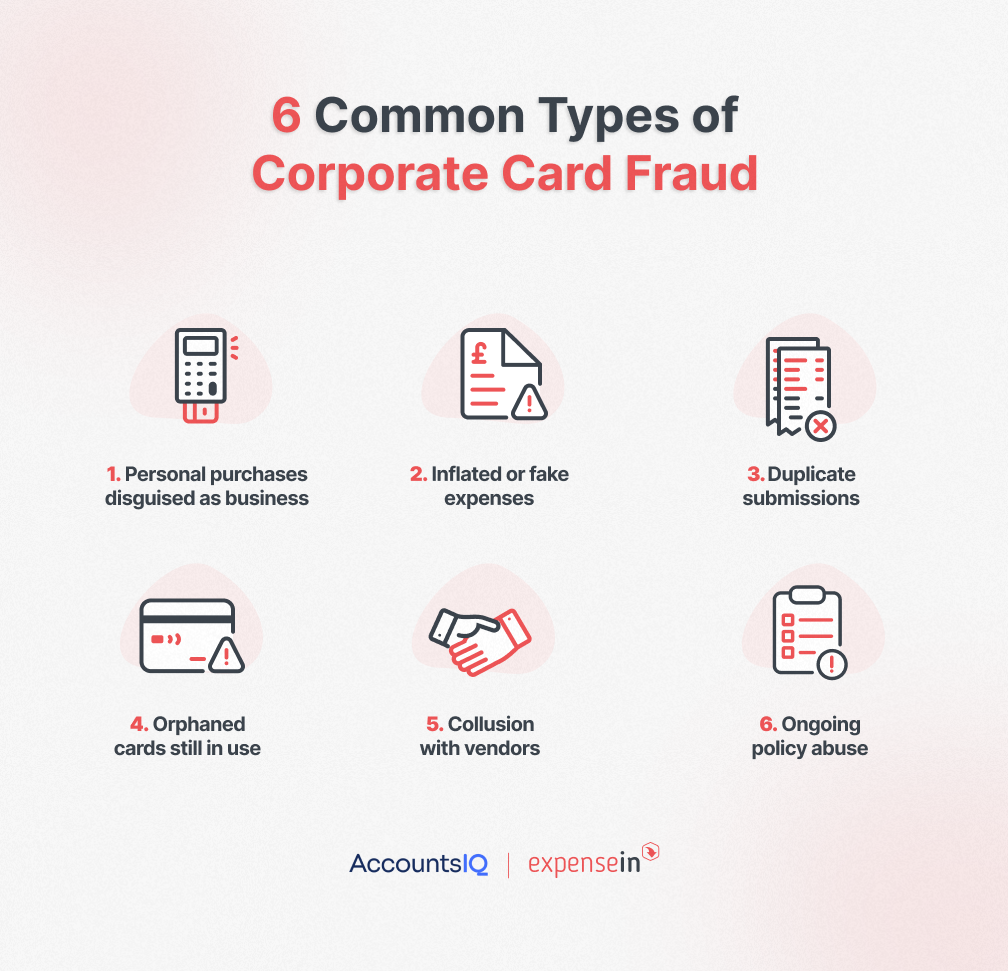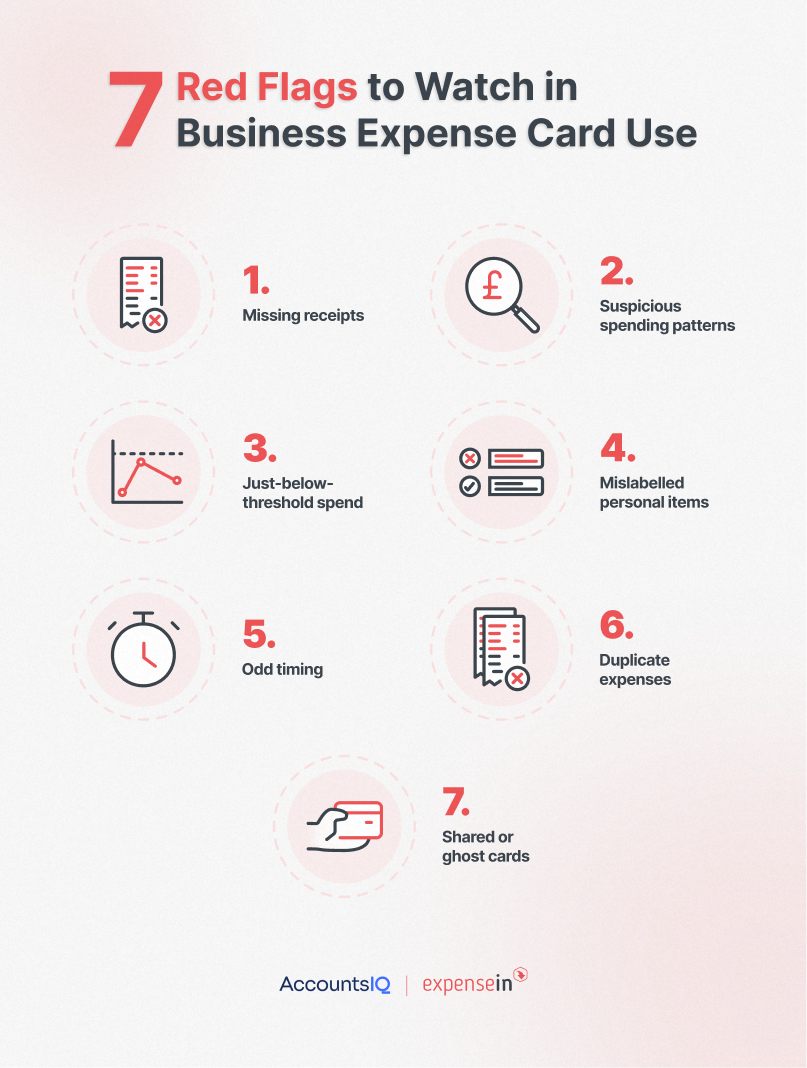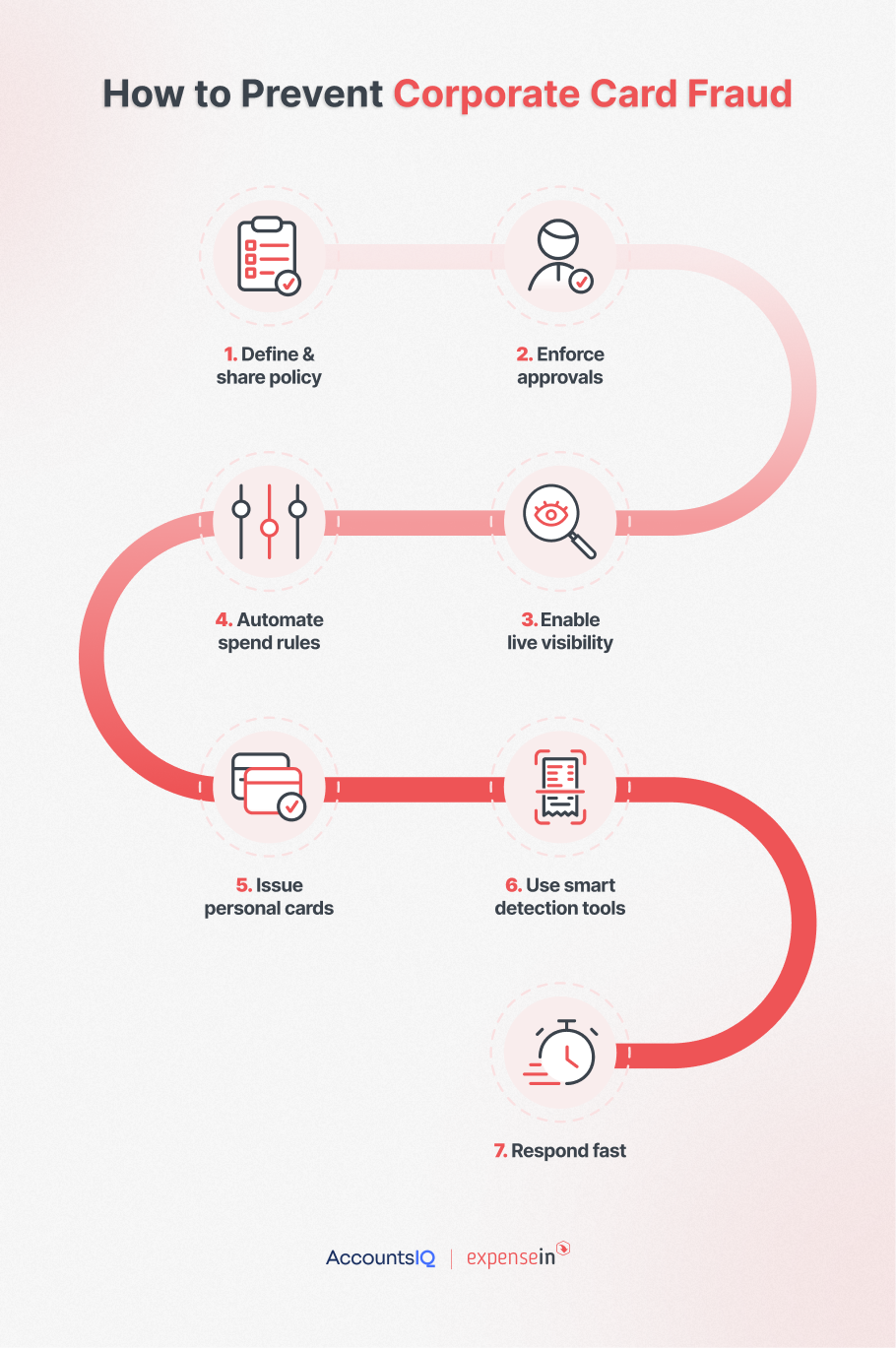Imagine this…
It’s a Monday morning, and you’re scanning your team’s corporate card transactions. A weekend charge at an electronics store catches your eye – no context, no receipt, and no obvious business reason. No one flags it. No one explains it.
That’s how it starts.
In today’s day and age, where business expense cards are the norm, misuse is often subtle and dangerously easy to overlook. From “accidental” personal purchases to deliberate fraud, corporate card abuse is real, rising, and deeply costly.
KPMG's Fraud Barometer reported that in 2023, UK businesses faced nearly £1 billion in losses due to employee-related fraud.
The worst part? Many companies don’t see it coming. And those red flags? They were there all along.
The Hidden Cost of Corporate Card Convenience
Corporate cards, whether traditional credit or company expense card programs, have become essential.
They streamline business spending, eliminate expense reimbursement headaches, and empower employees to get things done.
But convenience can come at a cost.
32% of occupational fraud stems from a lack of internal controls
19% of cases happen when employees override existing safeguards
Many companies lose 5% of their annual revenue to fraud, much of it expense-related
And it doesn’t take much. From small policy violations to million-pound frauds, the warning signs often look the same if you know what to look for.
6 Common Corporate Card Fraud Schemes
 Before diving into red flags, here’s what expense fraud can look like behind the scenes:
Before diving into red flags, here’s what expense fraud can look like behind the scenes:
1. Personal purchases labelled as business
An employee claims a family dinner was a “client meeting,” or buys personal electronics and logs them as “IT equipment.” It happens.
2. Inflated or fictitious expenses
Think blank taxi receipts filled out later, or entire fake events and services.
3. Duplicate claims (double dipping)
An expense charged to a card and submitted for reimbursement. Or the same receipt, submitted twice.
4. Orphaned cards still in use
A former employee’s card wasn’t deactivated. Months of rogue spending follow. Or a stolen card is used online undetected.
5. Collusive vendor scams
An employee colludes with a vendor to bill for fake services, pocketing the proceeds.
6. Ongoing policy abuse
Booking first-class instead of economy. Dining at five-star venues. Repeated, unchecked overspending.
These range from nuisance-level leakage to serious embezzlement, and the most dangerous part is how easily they slip through when Finance isn’t watching in real time.
7 Red Flags in Employee Business Expense Card Use
Fraud doesn’t hide. It leaves patterns.
 Watch for these telltale signs in your business expenses card program:
Watch for these telltale signs in your business expenses card program:
1. Missing or vague receipts
No documentation? That’s a problem. Generic or incomplete receipts (e.g. no vendor, no date) are a classic smokescreen.
2. High or frequent spending in specific categories
One employee constantly maxes meal budgets or books luxury hotels? That’s not a coincidence – it’s a pattern.
3. Rounded numbers & just-below-threshold spend
Lots of £99 purchases when the receipt thresholds start at £100? That’s gaming the system.
4. Personal items hidden in miscellaneous categories
Look out for vague entries like “supplies” or “software” that don’t align with an employee’s role.
5. Odd timing
Weekend charges. Late-night bar tabs. Monday morning travel bookings for “urgent” Friday meetings? Unusual timing deserves scrutiny.
6. Duplicate or overlapping expenses
Two employees claim the same dinner. One expense appears in multiple reports. If it feels familiar, it might be.
7. Shared cards & ghost cards
If you can’t say exactly who used the card, or if someone who’s left the company is still charging, that’s a risk screaming for a process fix.
How Finance Teams Can Stop Corporate Card Fraud
Corporate fraud is a symptom. The cure is clarity, accountability, and visibility.
 Here’s how to get there:
Here’s how to get there:
1. Set (& enforce) a clear policy
Your corporate expense card policy should include:
Who gets a card and why
What spend is permitted vs. prohibited
Receipt and submission deadlines
Escalation for breaches
Train all cardholders and have them sign off. Then retrain regularly. Fraud prevention starts with clear expectations.
2. Use multi-level approvals
Never let one person sign off on their own expenses.
Route every card transaction through a manager
Escalate large or out-of-policy spend to finance
Spot-check expense types for high-risk categories
Pro Tip: Make expense approval part of performance management for budget holders. Accountability matters.
3. Enable real-time spend visibility
Month-end is too late. Your finance team should see spend as it happens, not after.
Use tools that:
Feed in transactions instantly
Flag anomalies based on patterns
Let you filter by category, role, region, or employee
4. Automate controls at the point of purchase
Don’t rely on after-the-fact audits. Instead:
Cap daily or monthly spend by cardholder
Restrict merchant types (e.g. no personal retail, gambling, luxury goods)
Require receipts to be attached immediately
With employee business cards like ExpenseIn’s expense card, this is all possible and automated.
5. Issue individual cards (& never share)
Assign every employee their own card. That way:
You know exactly who spent what
You can tailor controls per person
There’s no hiding behind a shared account
It’s also easier to freeze or adjust a card if issues arise.
6. Let technology flag the red flags
AI and automation can:
Detect anomalies in timing, amount, or geography
Catch duplicates
Validate receipts
Trigger alerts for out-of-policy spend
Your team shouldn’t spot fraud by chance. Your tools should spot it first.
7. Act fast & set a standard
If you spot misuse:
Freeze the card immediately
Investigate with HR or internal audit
Recover funds if needed
Escalate legally if appropriate
Just as important: Recognise good behaviour, too. Celebrate policy compliance and transparency.
How ExpenseIn’s Expense Card Prevents Fraud (By Design)
Fraud prevention isn’t just about catching bad actors – it’s about eliminating the loopholes they exploit. That’s exactly what ExpenseIn’s expense card was built to do.
Where traditional corporate cards separate payment from policy enforcement, ExpenseIn brings everything together in a single, real-time platform.
 That means finance teams get full control over spend before, during, and after each transaction, without needing to chase paper trails or audit after the fact.
That means finance teams get full control over spend before, during, and after each transaction, without needing to chase paper trails or audit after the fact.
Here’s how it works:
Built-in controls that block risky spend automatically
With ExpenseIn, every card can be tailored with custom limits by employee, team, merchant category, or geography. You can:
Set daily or monthly caps
Block specific retailers or spending types (e.g. personal retail or alcohol)
Instantly freeze any card showing suspicious activity
Need to increase someone’s limit for a project? One click. Want to stop overseas spend on a card? Done.
The result: Fewer policy breaches, fewer awkward conversations, and no surprises on your next budget review.
Instant visibility across every card & transaction
As soon as an employee uses their card, the transaction appears in your ExpenseIn dashboard – complete with vendor, category, and timestamp.
This real-time visibility means red flags get spotted early, not weeks after the fact. Finance teams and managers can act fast, and employees are far less likely to push boundaries when they know every purchase is transparent.
Instant receipt capture & automated matching
The moment a card is used, ExpenseIn prompts the user to snap a receipt, which is instantly attached to the transaction and automatically matched with merchant data.
This removes the need for chasing receipts, filling in spreadsheets, or relying on memory. It also ensures audit-ready records for every transaction, cutting admin and tightening compliance at the same time.
Eliminate reimbursement fraud completely
With ExpenseIn’s, employees never need to use personal funds or submit manual expense claims.
Every business purchase is made on a company card, logged in real time, and tied to a named user.
That means:
No double claims
No “lost receipt, please reimburse”
No risk of out-of-pocket stress
All transactions flow directly into the central expense platform, giving finance a single source of truth, not a patchwork of bank statements and expense reports.
Control, oversight, & confidence – all in one platform
If your team is still using corporate cards with little control, shared accounts, or month-end reconciliations, you're operating with risk.
The ExpenseIn expense software and expense cards are designed to give you peace of mind, without adding friction for your team.
You get:
Centralised, live visibility
Granular card controls
Automated compliance
Faster reconciliation
Fewer sleepless nights
Want to see how it works in practice? Book a free demo and see how the ExpenseIn Expense Card can transform the way your business controls spend and prevents fraud.
Don’t Wait for Corporate Fraud to Teach You the Lesson
Fraud isn’t always dramatic. It starts small. But small leaks sink big ships.
Whether it’s a £100 fake taxi ride or a £1 million fake vendor, corporate card misuse is a threat finance leaders can’t afford to ignore.
The red flags are out there. Are you watching for them?
Now’s the time to:
Review your expense policy
Centralise your card management
Equip your team with tools that make fraud prevention easy
Ready to shut down corporate card fraud before it starts? Book a demo to explore ExpenseIn’s fully integrated expense card solution.




